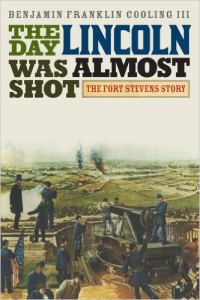The Day Lincoln was almost Shot: the Fort Stevens Story by Benjamin Franklin Cooling, III, Scarecrow Press, 2013 ISBN-10: 0810886227; ISBN-13: 978-0810886223
The Day Lincoln was almost Shot offers Benjamin Franklin Cooling’s compelling look at a lesser-known but still crucial episode in the War Between the States. In the heart of the book, Cooling presents a thorough re-telling of the culminating events of Jubal Early’s invasion of Maryland in July 1864–with a discussion about some of the various possibilities–and a comprehensive review of the President’s appearance or appearances on the front line.
The book’s background extends to the American defeat at the Battle of Bladensburg, Maryland, and the consequent capture of Washington City during the War of 1812. During the Civil War, the capital city became the “base headquarters of the northern armies.” As the Confederates’ most obvious military objective, just across the Potomac River from Virginia, Washington was quickly transformed into a fortress, ringed with forts, breastworks, and gun emplacements. Although Confederate victories in 1861, 1862, and 1863 fuelled Union fears for the city’s safety, not until Ulysses Grant took over the direction of the federal war effort did real danger of the city’s capture arise.
He led the Army of the Potomac and the independent (for the first few weeks) Ninth Army Corps against Robert E. Lee. Unable to defeat the rebels at the Wilderness, Spotsylvania Court House, or the North Anna, Grant kept leading his force to the south and east, opening up the enemy’s path to Washington. He failed one more time at Cold Harbor. In enumerating the tremendous casualty lists from the Overland campaign, the author noted that there was “[l]ittle wonder Grant acquired the dubious sobriquet ‘butcher.’” These federal losses led him to strip the North of available soldiers, especially the Heavy Artillery and other regiments guarding the capital, which left it vulnerable to a quick rebel thrust.
In response to the Union’s failures, Lee dispatched one of this three army corps, under Jubal Early, to counter David Hunter’s initial success in the Shenandoah Valley. Although it was a “brilliant gamble,” Lee was still censurable for multi-tasking Early during the invasion, such as a proposal to free Confederate prisoners at Point Lookout, Maryland. When the hapless Hunter retreated in the wrong direction, leaving the Valley open to the Confederates, Early took advantage of the opening. “Lee was winning the game of risk in Virginia,” while “Grant appeared clueless.” The author rightly credits Sigel in responding to Early’s advance. He avoided getting gobbled up by a vastly superior force and blocked the rebels from the direct route to Washington.
Serendipitously for the Union, the next commander encountered by the enemy columns was Lew Wallace, who had been made a “scapegoat for some of Grant’s questionable actions at Shiloh.” Here, Lew “acted while others waited.” He rushed his militia and a veteran division of the Sixth Corps–which had just arrived from Petersburg without wagons or guns and with only the ammunition carried by each soldier–to the banks of the Monocacy River. Grant “still seemed out of touch, ” with an “apparent cavalier attitude toward the capital city’s safety.” Among the various problems engendered by Grant’s attendance with the Union armies around Petersburg, telegraph communication between the capital and the front was frequently broken by rebel saboteurs. Despite the fearful odds, Wallace battled the Confederate force for a good part of the day, before retreating in disordered defeat toward Baltimore. His action, however, caused a day’s delay in Early’s approach. It proved of immeasurable importance to the Union.
A timid Christopher Augur was in command at the undermanned federal capital, but Washington was saved by the nick-of-time arrival of Horatio Wright. Grant had sent him with the remainder of the Sixth Corps. Its presence fended off the Confederate menace. During the ensuing skirmishing, Lincoln visited Fort Stevens, although there is confusion as to whether he did so on one day or two. He almost got shot July 12th. In the end, Early withdrew, and “[f]inal victory shielded Grant, who nearly lost the capital because of myopia.”
In researching this episode, Mr. Cooling encountered the typical difficulties when writing about the American Civil War: the multiplicity of accounts, manifold inaccuracies, and even downright falsehoods of the participants. This is a work of research well worth buying and reading.

